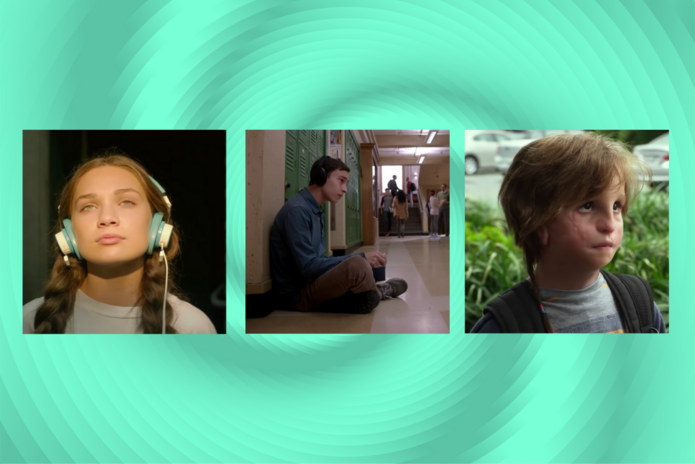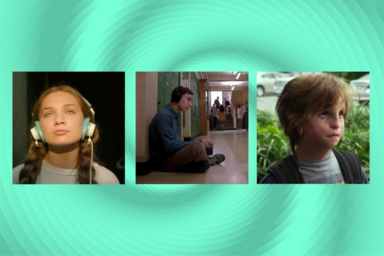In February, Sia’s movie Music hit the box office and completely missed the mark, upsetting the autism community and stirring important conversations about disabled representation in the media. The film follows the story of a young girl with autism named Music — but to everyone’s confusion and anger, the role was played by neurotypical actress Maddie Ziegler.
Not only was Ziegler’s caricature-like performance extremely offensive to the autism community, but the usage of restraints on her character was both incredibly outdated and harmful. Zoe Gross, director of advocacy at the Autistic Self Advocacy Network, told USA Today in a statement, “The autistic community has been fighting for decades to end the use of restraints that traumatize and kill. Had the filmmakers chosen to meaningfully involve autistic people from the beginning, we could have told them how catastrophically irresponsible it is to encourage viewers to use the kind of deadly restraints that killed Max Benson, Eric Parsa, and many other members of our community.”
When criticized about the numerous issues surrounding her film, Sia’s snippy and defensive responses further upset the community. Back in November 2020, Sia engaged in multiple fiery Twitter feuds regarding her promotion of ableism in the film. One user tweeted at Sia, “You should know better than to allow able-bodied & neurotypical to represent the disabled community. It’s incredibly offensive as is the [infantilization] of the character. Sickened. And not even captioned. Don’t release this.” Though Sia has now deleted her Twitter account, she responded, “I actually tried working with [a] beautiful young girl non-verbal on the spectrum and she found it unpleasant and stressful. So that’s why I cast Maddie.”
“Most of the people who have any power in this regard don’t think disabled people are real people. We’re artistic exercises to them.”
Though Music is grossly insensitive and disturbing, the fact of the matter is that there are so many other movies and television shows just like it: countless forms of entertainment that do not accurately depict or represent disabled people, even though one in four of Americans have some type of disability. Sarah Kurchak, author of I Overcame My Autism And All I Got Was This Lousy Anxiety Disorder, accredits this scarcity of disabled representation to a lack of empathy. “To put it bluntly, I think [there is a lack of accurate representation] because most of the people who have any power in this regard don’t think disabled people are real people. We’re fodder. We’re artistic exercises to them,” Kurchak tells Her Campus.
For instance, the popular Netflix show Atypical stars actor Keir Gilchrist as Sam, a teenage boy with autism — but Gilchrist does not have autism. Although Gilchrist studied and researched for the role, the casting team of Atypical could have (and should have) cast an autistic actor, but consciously chose not to. In response to criticism regarding Gilchrist being cast as Sam back in 2017, the official Atypical Twitter account said, “Auditions for Sam included autistic actors, but Keir was cast as best for the role. The cast does include autistic people.” However, there was only one actor with autism during the show’s debut in 2017, at the time this was tweeted. Additionally, Atypical fails to depict the diversity and inclusion that is actually present in the autism community — the show follows a typical middle-class, white family, and Sam is a white and heterosexual male. The show also does not adequately showcase autism in girls or women, which presents itself very differently than it does in men.
Moreover, the issue of inaccurate representation is present not only within the autism community, but the entire disabled community. 2014’s The Theory of Everything, which tells the story of theoretical physicist Stephen Hawking, who has amyotrophic lateral sclerosis (ALS), starred Eddie Redmayne as Hawking. Although Hawking was consulted throughout the filming process, why was Redmayne, who is able-bodied, cast for the role instead of a disabled actor who actually has ALS?
“It’s still painfully rare for me to see any evidence that a disabled story made by non-disabled people has ever stopped to consider that we might be part of their audience, or that we might be artists ourselves.”
And what about Wonder? The 2017 movie is about a young boy named Auggie who has a craniofacial condition called Treacher Collins syndrome, but the role is played by Jacob Tremblay, who does not have a craniofacial condition. In an article written for Teen Vogue, Ariel Henley, who grew up with Crouzon syndrome, writes, “It was devastating to realize that the directors involved with Wonder would rather cast a healthy, ‘normal’ looking child and put him in makeup and prosthetics, rather than cast someone who looked like me.” Furthermore, Auggie’s facial appearance in Wonder is not very accurate, and is even dulled down to appeal to its audience — his facial disfigurement is minor compared to the book and cases of people who actually have a craniofacial condition. This contorts people’s real-life understanding of what craniofacial conditions and similar disabilities are actually like.
There are so many more examples I could name, but the crux of the matter is this: there needs to be more accurate disabled representation in Hollywood — and simply more disabled representation in general, period. It’s important for a multitude of important reasons, from educating non-disabled people about the societal challenges that disabled people face to empowering the disabled community through accurate representation.
“It’s still painfully rare for me to see any evidence that a disabled story made by non-disabled people has ever stopped to consider that we might be part of their audience, or that we might be artists ourselves,” Kurchak says. “We’re not going to get anywhere meaningful until that attitude changes.”
The lack of accurate representation of the disabled community in the entertainment industry has extremely negative effects within the disabled community, as members of the community feel both misrepresented and underrepresented. Kendall Ciesemier, writer and co-host of the That That Don’t Kill Me podcast, tells Her Campus, “Inaccurate representation is dangerous. It flattens us to either be pitied or ‘inspiring,’ both narratives that most disabled folks resent. I think it creates continued misunderstanding and even sometimes elevates the stigma that we are ‘weaker’ or ‘less than.’”
“Inaccurate representation is dangerous. It flattens us to either be pitied or ‘inspiring,’ both narratives that most disabled folks resent.”
According to a See Jane 2020 report, one in five characters with disabilities in popular family movies follow the “super crip” stereotype, which promotes the notion that a person with a disability needs to “overcome” their disability to ultimately be beneficial to society. This archetype reaffirms the societal superiority of those without disabilities as well as glorifies those with disabilities who are “able to live a normal or successful life.”
“It’s very disheartening and frustrating to know that people like the abstract idea of you when it’s created in their own image, but they show far less interest in you as actual people. Fictional disabled people written by and for non-disabled people — and generally portrayed by non-disabled people — misses the mark in so many ways,” Kurchak tells Her Campus. “First, it generally makes for hollow and tedious stories. We’re far more interesting than whatever abled people’s fears and need for inspiration project on us. Secondly, it does tend to make life harder for us. When the average person’s concept of our lives and our disabilities comes from these uninformed and often exploitative fictions, it adds even more layers of ignorance and confusion to our lives.”
Although there are deeper systemic issues and negative attitudes attached to the lack of inaccurate representation of disabled people in Hollywood that need to be resolved, there is one simple answer that can help fix the problem, best said by Kurchak: “Hire disabled people. And don’t just hire white disabled people. Give us the freedom to tell our own stories. And believe us when we tell you that these are our stories.”
Experts:
Kendall Ciesemier, Writer and Co-Host of That That Don’t Kill Me Podcast
Sarah Kurchak, Author of I Overcame My Autism And All I Got Was This Lousy Anxiety Disorder
Studies:
Heldman, Caroline, et al. (2020). See Jane 2020 Report. The Geena Davis Institute for Gender in Media at Mount St. Mary’s.


